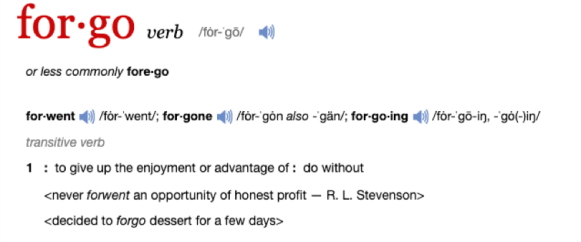
Forgo and forego look very similar, so it makes sense that this is a common spelling error. In this post, I will give you their definitions and explain a mnemonic device to help you remember the difference.

Merriam-Webster Unabridged
Forgo (without the E) means to go without something. You give something up and you refuse it.
Here are a couple examples of forgo in a sentence:
- Declaring a diet, the rat says he will forgo cheese.
- Because she broke her foot, Nancy forwent dancing.
Forwent, as you can see from the second example, is the past-tense version of forgo.

Merriam-Webster Unabridged
Forego (with the E) means to go before something. You may recognize this word from the popular term foregone conclusion, which means a conclusion that someone can predict before the action happens.
Here are a couple examples of forego in a sentence:
- The introduction forgoes the first chapter.
- The contest forewent the medal ceremony.
Forewent is the past tense of forego.
Mnemonic device: To remember the difference between these words, link the word before with forego.
Forego means to go before something.
Remember that and there are two fewer words you can get confused!
Erin Servais is the founder of Dot and Dash, LLC, an author-services company focusing on women writers and offering a range of editing, coaching, and social media packages.
Sign up for the Dot and Dash newsletter to get writing tips and tricks and exclusive deals.
Follow Dot and Dash on social media.
Twitter: @GrammarParty
Instagram: @dot_and_dash_llc
Facebook: facebook.com/dotanddashllc
Pinterest: www.pinterest.com/dotanddashllc

Claim your free author coaching session here: https://www.dotanddashllc.com/coaching